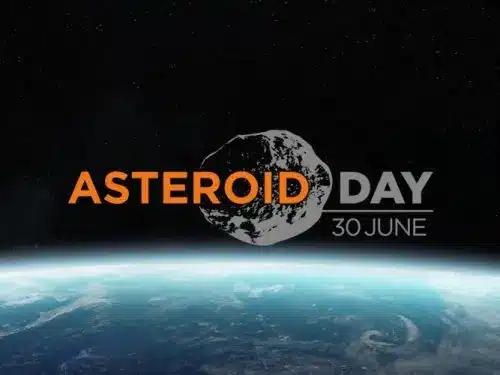World Asteroid Day: History, Theme, and Significance

Every year on 30 June, the United Nations observes Asteroid Day to raise public awareness of the risks of asteroid impacts. This day serves to educate the public about asteroids and the risks and opportunities associated with them. We can accomplish this by hosting events, providing educational resources, and communicating with the global audience via multiple digital platforms.
The day commemorates the impact of the asteroid Tunguska in 1908. It also raises awareness about the importance of asteroids to the formation of our universe, how their resources can be used in the future, how asteroids pave the way for future exploration, as well as how we can protect our planet from asteroids’ impacts.
What Are Asteroids?
Asteroids are small rocky bodies that orbit the sun. They are commonly found between the orbits of Mars and Jupiter, but some have more eccentric orbits. Asteroids are rocky-metallic objects that range in size from about the size of pebbles to 600 miles across. As they are so small, they are not considered planets, but they orbit the Sun. Although they orbit the Sun, they are so small that they are not considered planets. They are also known as the remnants of the Solar System.
Tunguska impact: Explained
On 30 June, the anniversary of the Tunguska impact is observed. On that day, an explosion occurred over the Podkamennaya Tunguska River in Siberia, Russia. NASA estimates that the asteroid entered Earth’s atmosphere at a speed of 33,500 miles per hour. The 220-million-pound space rock heated the air around it to 44,500 degrees Fahrenheit. Around 28,000 feet above Earth, pressure, and heat caused the fragment of the asteroid to annihilate itself, resulting in a fireball. About 185 Hiroshima bombs’ worth of energy was released during this explosion. An estimated 80 million trees were destroyed over an area of 830 square miles (2,150 square kilometers) of forest. The blast was thought to have been caused by an asteroid or a comet. Tunguska is regarded as the largest asteroid impact on Earth in recorded history.
World Asteroid Day: History
In December 2016, the United Nations General Assembly adopted resolution A/RES/71/90, declaring 30 June the International Asteroid Day to commemorate the impact of the Tunguska asteroid over Siberia, Russian Federation, on 30 June 1908, and to raise public awareness about asteroid impact hazards.
Asteroid Day was co-founded by astrophysicist and lead guitarist of QUEEN Dr. Brian May in collaboration with Danica Remy, president of B612 Foundation, astronaut Rusty Schweickart, and filmmaker Grig Richters to raise awareness about the significance of asteroids in the formation of our universe and the role they play in our solar system today.
World Asteroid Day: Significance
Asteroid Day raises awareness about the devastating impact of an asteroid when it crashes into the Earth. The role of asteroids in the formation of our universe, how they can be used in the future, how they provide the way for future exploration, as well as how we can protect our planet from the impacts of asteroids.
Hence, asteroids are rocky objects found orbiting around the Sun as well as between Mars and Jupiter. An understanding of asteroid impacts is essential. Therefore, this World Asteroid Day is celebrated across the globe in order to educate people about asteroids and their impacts.
Read More: 30 June in Indian and World History
Observer Voice is the one stop site for National, International news, Sports, Editor’s Choice, Art/culture contents, Quotes and much more. We also cover historical contents. Historical contents includes World History, Indian History, and what happened today. The website also covers Entertainment across the India and World.
Follow Us on Twitter, Instagram, Facebook, & LinkedIn

